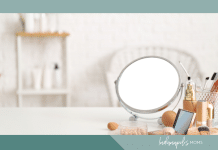I will admit it: I was a bit of a late bloomer. I didn’t date much in high school or college. I was content with my circle of friends and wasn’t overly concerned with tying myself down at an early age. I never had a “life plan” like some of my girlfriends did, where they had a perfectly planned out schedule of their life events. Married at 22, babies at 25, 27 and 29. Yadda, yadda, yadda. That’s not really my thing.
So I made my own life plan: I dated a bit, didn’t enjoy it much and ended up meeting my now husband years before we actually dated when we worked together. By the time we had been dating a year, I was in my early 30s and on our wedding day, I was one month shy of 34. We knew we wanted to start our family fairly soon after we were married, but life threw us a few curveballs, and after 3 miscarriages, we were still childless and I was already 36. All of a sudden, the phrase “my biological clock is ticking” was on repeat in the back of my mind.
In most cases, 36 doesn’t sound too old. But when you’re talking about “prime baby-making years,” anything over 35 is officially labeled as “advanced maternal age.” (Also known as “old ladies trying to have babies.”) It was sort of comical that the Ob-Gyn’s office would often mention my age and once I turned 35, it was like my file was color-coded and put into a totally different area of the office. Thankfully, my doctor is phenomenal and never made me feel like I was old, but there were things that I had to have done throughout my pregnancies simply because of my age. I had more ultrasounds (I was already high risk, but they had told me because of my age, they would monitor me even more closely), I had more frequent stress tests and was more likely to develop complications such as preeclampsia. After all the hullabaloo, I finally delivered my son when I was 37 and then my daughter followed 2 days after my 38th birthday.
Being on the flip side now, I am actually thankful that my medical team monitored me as closely as they did throughout my pregnancies. But in terms of the spectrum of parenthood, I am on the “older” end. When my babies graduate high school, I’ll be 55 and 56 or so, which to me, doesn’t sound that old. But I also have good friends whose kids are just starting college, some are just starting kindergarten and everything else in between.
Just as everything in life, there are benefits to doing things both ways. My friends who have kids in college are living it up now in their late 30s and early 40s, while I’m just getting started and up to my eyeballs in diapers and bottles. But I was able to do things that I wanted to in my younger years while those friends were busy taking care of their babies. Regardless of when you decide to have your children or when you are lucky enough to be blessed with the gift of parenthood, everyone does things on their own time. There’s really no need to label us “advanced maternal age” simply because of the number of years I have on this planet. I know some 45-year-olds that are healthier and in better shape than some 20-year-olds so maybe we should just stick to the idea that “age ain’t nothing but a number”.
![]()








